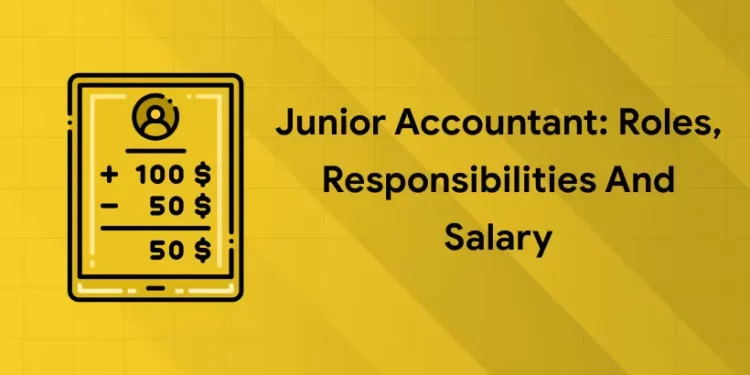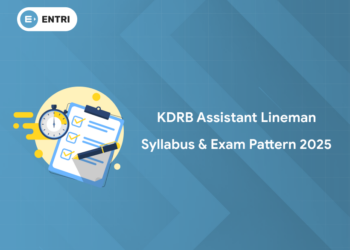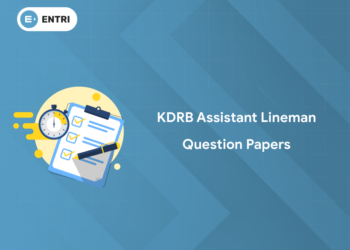Table of Contents
There is an increasing demand for qualified experts who can assist in managing, interpreting, and safeguarding our financial resources as firms expand and financial regulations change. This is exactly why a junior accountant is an important instrument in the smooth functioning of a firm. But what are the duties and responsibilities of a junior accountant? Let us read further to learn more about junior accountant roles, responsibilities, salary etc.
Click here to learn more about junior accountant roles, responsibilities, salary etc!
Junior Accountant: Roles, Responsibilities & Salary: Introduction
We have discussed why a junior accountant is important for a firm. But being important for a company is not something that can stand alone as an incentive for choosing that career. Many things should be taken into consideration before deciding on a career. The first one among them is the roles and responsibilities of that career and if those suits your personality. Then you should know the skills that are required to get that job and if you have the aptitude to learn them. Then comes the average annual salary of that post in your country. It is not advisable to go into a career if it doesn’t help you earn a liveable salary. Then you should look at the career growth prospects for that job position.
You should choose that career only if all the factors discussed above are in your favour. So, let us learn more about junior accountant roles, responsibilities, salary etc. before deciding to join the practical accounting course offered by the Entri app.
Who Is a Junior Accountant?
1: Accounting provides information on
Professionals in charge of keeping accounts, receivables, or payables, writing journal entries, and creating financial statements are known as junior accountants. While creating reports on the improvements that were achieved throughout each month, they also handle the payroll process for the staff members of their organization regularly.
Want to learn practical accounting? Register for the Entri Apps accounting online course!
Placement Oriented PWC Business Accounting Course
PWC Certified Business Accounting Course by Entri App: Master in-demand skills, ace interviews, and secure top-tier jobs.
Join Now!Roles of a Junior Accountant
The work of junior accountants is essential to preserving the financial integrity of an organization. They support account reconciliation, record keeping, and adherence to financial regulations. While their title says ‘junior,’ their responsibilities are far from minor.
Management of Financial Records
Maintaining correct financial records and making sure that each financial transaction is appropriately documented are the duties of junior accountants.
Accounting Reconciliation
They are in charge of finding and fixing discrepancies as well as balancing bank statements, accounts payable, and accounts receivable.
Assisting with Audits
Junior accountant’s roles and responsibilities ensure that all financial records are in order and provide appropriate documentation to auditors, which helps prepare for financial audits.
Compliance
Junior accountants help to avoid legal problems by making sure the business complies with tax and financial requirements.
Ultimately, the maintenance of a company’s financial stability and compliance depends on junior accountant roles. They are a great asset to any finance team because of their wide range of responsibilities.
What are The Responsibilities of a Junior Accountant?
We have discussed the roles of a junior accountant above. Other than that, there are many day-to-day responsibilities that a junior accountant is meant to carry out. Some of those responsibilities are discussed below.
Data Entry
Junior accountants ensure that all transactions are recorded and accurately enter financial data into the company’s accounting system.
Financial Reporting
Junior accountants help prepare financial reports that show the organization’s financial health, such as cash flow statements, income statements, and balance sheets.
Monitoring Expenses
They keep tabs on and record business spending, assisting management in making wise judgments on cost reduction and budgeting.
Skills Needed to be a Junior Accountant
A broad skill set and certain educational requirements are necessary for success in a junior accountant position. Prospective junior accountants should focus on the crucial aspects listed below:
Educational Background
A bachelor’s degree in finance or accounting is typically required for junior accountant positions.
Attention to Detail
Junior accountants need to have an excellent eye for detail to analyze financial data and identify issues.
Analytical Skills
They ought to be able to decipher financial data, spot trends, and make recommendations based on facts.
Technical Knowledge
It is essential to be proficient with accounting software such as QuickBooks or Excel. It can also be helpful to be familiar with enterprise resource planning (ERP) technologies.
Certifications
Obtaining qualifications such as the Certified Management Accountant (CMA) or Certified Public Accountant (CPA) can greatly improve one’s chances of landing a job. ACA, ACCA, or CIMA qualifications are preferred but not necessary.
Soft Skills
A junior accountant should also be well-organized, have strong communication and teamwork abilities, be able to operate under pressure, and meet deadlines.
Click to register for Entri Elevate – Business Accounting & Finance Certification Programme!
Placement Oriented PWC Business Accounting Course
PWC Certified Business Accounting Course by Entri App: Master in-demand skills, ace interviews, and secure top-tier jobs.
Join Now!How to Be a Junior Accountant?
It takes commitment and diligent work in the proper direction to get to the position of junior accountant. The steps to becoming a junior accountant are listed below:
Get A Degree
Initially, a bachelor’s degree in accounting or a closely related discipline, such as finance or commerce, is required. This strengthens your base and gives you the essential accounting basic knowledge.
Join Internships
An internship gives you real-world experience and exposure. Attempt to apply for accounting department internships. This could improve your understanding of the line of work and your obligations.
Acquire The Required Skills
This entails mastering programs like Excel, Tally, and QuickBooks, which are frequently used for accounting tasks. Increasing your analytical abilities will undoubtedly aid in your advancement.
It will be easier to acquire these skills if you join an online course solely focusing on this. Entri app is providing a practical accounting course at present. The goal of the Entri’s Practical Accounting course is to give students a thorough understanding of accounting methods and principles. The course involves practical projects and covers a wide range of topics, from basic concepts to advanced concepts. Concentrating on TallyPrime, Zoho Books Excel can assist you in developing vital skills. Additionally, the program includes UAE Accounting and Finance, imparting knowledge on corporate law, taxation, banking, and labour legislation.
Obtain Certifications
Credentials such as Certified Public Accountant (CPA) or Certified Management Accountant (CMA) enhance your employability and lend legitimacy to your knowledge. You will have many exciting learning opportunities and chances to advance on your path to becoming a junior accountant. In this sector, perseverance and consistency are essential, and having the appropriate knowledge and abilities can help you succeed.
ALSO READ: Top 5 Careers after completing Tally Course
Salary in INR Of a Junior Accountant
All the information provided here is from Internet sources. A source’s data indicates that the average salary of a junior accountant in India is ₹15T – ₹21T per month. Another source says that as of 2021, the average income for a junior accountant in India is ₹540,263, while the range is usually between ₹389,854 and ₹701,423. Salary ranges can differ significantly based on a variety of significant aspects, such as years of experience, education, certifications, and extra skills.
Career Growth After becoming a Junior Accountant
A job as a junior accountant may be a fascinating journey with many opportunities in the accounting and finance sectors. Future accountants may see a variety of career routes, such as becoming a Certified Public Accountant (CPA) or moving up the corporate ladder to become a Senior Accountant or Finance Manager. Some ways that speed up your career growth are listed below.
Listening to Professionals
Making the most of the guidance and recommendations from seasoned experts and professionals is essential if you want to grow as a junior accountant. Asking managers and senior accountants for advice and comments is also helpful.
Certifications
Obtaining professional qualifications, like the Certified Management Accountant (CMA) or Certified Public Accountant (CPA), can lead to more senior and higher-paying jobs. It’s critical to continuously learn and improve your abilities through webinars, online programs, workshops, and courses.
Higher Education
Continuing education via specialized courses or a master’s degree improves knowledge and job opportunities.
Professional Experience
Junior accountants frequently advance to leadership positions as they get experience, managing groups of people or entire departments.
Networking
Developing relationships and networking with coworkers, customers, suppliers, and other stakeholders can help you take advantage of opportunities for professional growth.
Join Entri Elevate – Business Accounting & Finance Certification Programme today!
Junior Accountant: Roles, Responsibilities & Salary: Conclusion
Synergy and teamwork are crucial in the financial industry. Junior accountants work in the finance division alongside experts like auditors, financial analysts, and senior accountants. Their responsibility is to ensure smooth coordination to preserve the organization’s financial stability. Junior accountants have to navigate an evolving financial collaboration and communication landscape. These relationships enhance the organization’s overall financial health and foster professional growth.
A career as a junior accountant is merely the beginning of a lifetime of opportunities in the financial and accounting industries. Junior accountants who embrace lifelong learning and consider a variety of possibilities can make significant career advancements in this fast-paced industry. Junior accountants can gain important information and skills from taking accounting courses, enabling them to confidently and competently negotiate the complicated worlds of finance and accounting.
Placement Oriented PWC Business Accounting Course
PWC Certified Business Accounting Course by Entri App: Master in-demand skills, ace interviews, and secure top-tier jobs.
Join Now!Frequently Asked Questions
What is the curriculum for the Practical Accounting course offered by Entri?
Every important topic is covered in the Entri Elevate – Business Accounting & Finance Certification Programme, from the foundations to real-world examples. The training will bolster the principles with relevant exercises and real-world financial accounting scenarios. A brief is included below.
- Business structure
- UA Accounting
- Banking
- Computerised Accounting Tally
- Direct & Indirect Taxation Compliance
- ERP
- Fundamentals of Accounting
- Law module
- Corporate and Labor
- Finance module
- Taxation
What are the responsibilities of a junior accountant?
Given below are some of the responsibilities of a junior accountant.
- Make sure all business transactions are documented by posting and processing journal entries.
- Create invoices and update accounts receivable.
- Revise accounts payable and carry out reconciliations.
- Help in processing income statements, balance sheets, and other financial statements by corporate accounting and financial policies as well as regulatory requirements.
- Help as needed with the review of payroll records, costs, etc.
- Update database financial data to guarantee that information is correct and readily available when needed.
- Create and submit reports on a weekly or monthly basis.
- Help senior accountants with the monthly and annual closing preparation.
- Help with additional accounting tasks
What are the benefits offered by the Entri Elevate - Business Accounting & Finance Certification Programme?
Entri Elevate – Business Accounting & Finance Certification Programme is one of the best practical account certifications provided in the online format. Some of the benefits offered by Entri Elevate – Business Accounting & Finance Certification Programme are listed below.
- Guidance from qualified Cas and industry experts
- Assignments and evaluation for practical accounting and tally
- Certification
- Placement assistance
- Live sessions for doubt clarifications
- 60 Hours of Video Courses on ERP Software and Accounting Concepts
- Self-paced Educational Resources in Native Languages (Tamil and Malayalam)
- Training in Tally Prime and Zoho books
Which positions are available for junior accountants?
Junior accountants can specialize in areas such as corporate finance, tax accounting, or auditing based on their professional interests.
What are the advantages and disadvantages of a career as a junior accountant?
Working in corporate accounting may provide a junior accountant with several advantages and disadvantages. Having safe and steady employment, receiving a competitive pay and benefits package, and having a range of professional alternatives are just a few of the advantages. Among the disadvantages are a heavy workload and high-stress level, ethical challenges and conflicts of interest, and a lack of flexibility and creative thinking.
What qualities constitute a good junior accountant?
A junior accountant who is successful has a solid understanding of basic and intermediate accounting concepts. They ought to be capable of carrying out simple mathematical procedures as well. Along with having attention to detail, a junior accountant should be able to adhere to corporate rules. In addition, they must be willing to fulfil deadlines under any circumstances.
Who is a Junior Accountant associated with?
Accountants employ and collaborate with junior accountants. They help them with routine duties such as creating journal entries and filing reports. Junior accountants work under their accountants, yet their jobs are closely related to profitable accounting endeavours.











